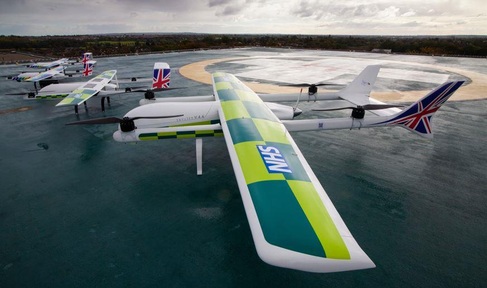NHS cancer patients will be first to benefit from chemo drone deliveries
NHS cancer patients will be the first in the world to benefit from chemotherapy delivered by drones as part of a new trial.

The drones, which will be making their first flights in the coming weeks, will be picking up and dropping the lifesaving treatment to patients on the same day.
Announcing the major trial on the NHS’s 74 birthday, NHS chief executive Amanda NHS said: “Delivering chemo by drone is another extraordinary development for cancer patients and shows how the NHS will stop at nothing to ensure people get the treatment they need as promptly as possible – while also cutting costs and carbon emissions.
“From a smartwatch to manage Parkinson’s to revolutionary prostate treatments and making the most expensive drug in the world available to NHS patients, it has been another amazing year of innovation in the way the health service delivers treatment and care.”
The trial will take place on the Isle of Wight, with chemo flown directly from the pharmacy at Portsmouth Hospitals University NHS Trust to St Mary’s Hospital, where staff will collect it before distributing it to hospital teams and patients.
Chemotherapy is difficult to transport as some doses have a short shelf life and drones will cut the usual delivery time from four hours to 30 minutes. This will save fuel and money and make cancer care more convenient for patients living on the Isle of Wight who often need to travel to the mainland for treatment at the moment.
The drone programme will be trialled initially in the Isle of Wight followed by Northumbria and could allow clinicians to make ‘same-day orders’ for vital medical equipment and other treatments.
For patients with advanced and aggressive forms of cancer, the NHS has struck a number of deals this year, from the 30-minute treatment for advanced womb cancer called Dostarlimab, to a life-extending injection for blood cancer, called daratumumab that can extend the lives of patients with a recurring and incurable cancer of the bone marrow cells – known as multiple myeloma – by an average of nine months.
NHS England also recently rolled out a cytosponge pilot, which uses a small capsule-shaped device which is swallowed and then extracted via a string to collect samples for analysis.
Pat Maunders, 64, from Rushden, in Northamptonshire was recently diagnosed with cancer of the oesophagus after taking part in the pilot.
Mrs Maunders, who had her treatment at Kettering General Hospital, said: “Overall it was a very quick procedure and there was no pain or discomfort and nothing to be afraid of.
“It is less intrusive and quicker than having a gastroscopy tube camera investigation under sedation and I was happy to have it instead and support the NHS research.
“Swallowing was easy and then you wait. The only slight irritation is when they carefully pull the sponge up – but that only lasts about three seconds.”
Talking about how the chemo drone will be able to support services in the Isle of Wight, the Isle of Wight NHS Trust, chief executive Darren Cattell said: “The Island has a long history of innovation. We are excited to continue that tradition by utilising the latest technology to overcome the challenges we face and to provide the very best service to our patients.
“We are still at a relatively early stage but the use of drones to transport medical supplies is a concept that has radical and positive implications for both the NHS and for patients across the UK as well as the Isle of Wight. It is great to be part of this innovative project.”
Alexander Trewby, chief executive of Apian, a medical drone start up, said: “My mother worked for the NHS in Portsmouth her entire life before she passed away from cancer three years ago.
“This project marks a very important first step in the construction of a network of drone corridors connecting hospitals, pathology labs, GP surgeries, care homes and pharmacies up and down the country so that in the future, everyone’s mother will benefit from the delivery of faster, smarter and greener healthcare.”
The trial is a joint effort between Isle of Wight NHS Trust, Portsmouth Hospitals University NHS Trust, Solent Transport, University of Southampton, King’s College London, Skylift, Modini, the Ministry of Defence, UKRI and Apian.
Latest News
 29-Jul-24
Dementia Bus gives carehome.co.uk staff insight into life with dementia
29-Jul-24
Dementia Bus gives carehome.co.uk staff insight into life with dementia
 27-Jul-23
UK's top home care agencies in 2023 revealed
27-Jul-23
UK's top home care agencies in 2023 revealed
 30-Nov-22
A quarter of older people keep their falls secret from family
30-Nov-22
A quarter of older people keep their falls secret from family
 29-Nov-22
'Covid-19 has not gone away' say terminally ill
29-Nov-22
'Covid-19 has not gone away' say terminally ill
 28-Nov-22
IT consultant who received poor care opens 'compassionate' home care business
28-Nov-22
IT consultant who received poor care opens 'compassionate' home care business